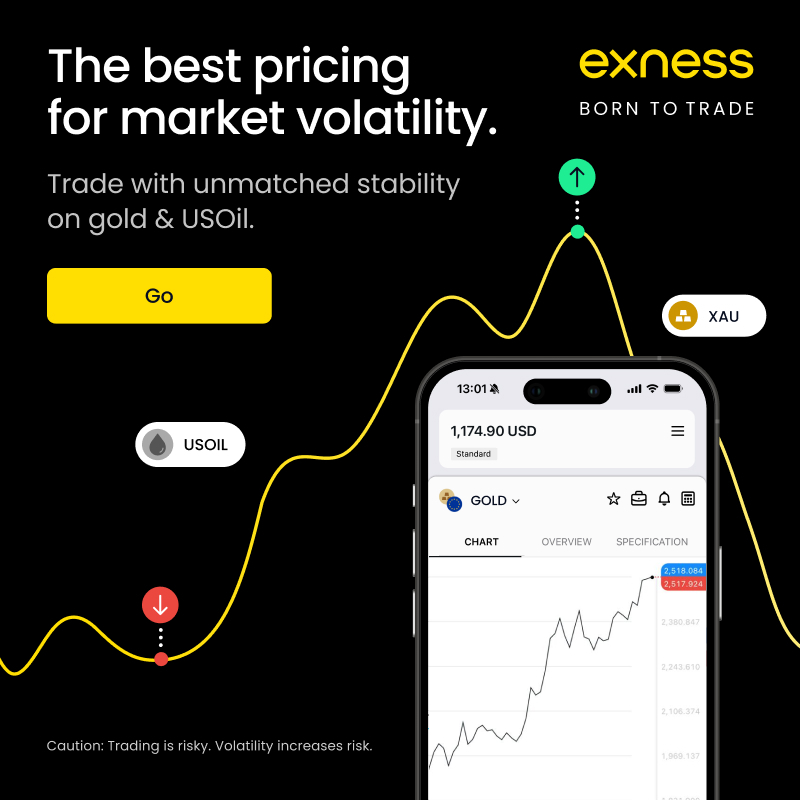
9 minute read
How to Start Forex Trading in Malawi: A Comprehensive Guide
from Exness
by Exness_Blog
Forex trading, the act of buying and selling currencies to profit from exchange rate fluctuations, has gained significant popularity in Malawi as a potential income stream. With the rise of internet access and online trading platforms, Malawians are increasingly exploring forex trading to diversify their financial portfolios. However, starting forex trading in Malawi requires careful planning, education, and adherence to best practices to ensure a safe and successful journey. This comprehensive guide provides a step-by-step approach to help beginners in Malawi navigate the forex market effectively, covering everything from understanding the basics to selecting the right broker and managing risks.
Top 4 Best Forex Brokers in Malawi
1️⃣ Exness: Open An Account or Visit Brokers 🏆
2️⃣ XM: Open An Account or Visit Brokers 💥
3️⃣ JustMarkets: Open An Account or Visit Brokers ✅
4️⃣ Quotex: Open An Account or Visit Brokers 🌐
What is Forex Trading?
Forex, or foreign exchange trading, involves exchanging one currency for another in the global marketplace. It is the largest and most liquid financial market in the world, with a daily trading volume exceeding $7 trillion. The forex market operates 24 hours a day, five days a week, making it accessible for traders in Malawi to participate at any time. Currencies are traded in pairs, such as EUR/USD (Euro vs. US Dollar) or USD/JPY (US Dollar vs. Japanese Yen), with the goal of profiting from changes in their relative values.
For Malawians, forex trading offers an opportunity to capitalize on fluctuations in the value of the Malawi Kwacha (MWK) against major currencies like the US Dollar (USD) or Euro (EUR). However, it’s a high-risk activity that requires knowledge, discipline, and a strategic approach to succeed.
Is Forex Trading Legal in Malawi?
Yes, forex trading is legal in Malawi, and the country has a population of approximately 18.3 million potential traders. The Reserve Bank of Malawi (RBM) oversees financial activities, including periodic interventions in the foreign exchange market to maintain stability. While forex trading is not directly regulated by the RBM, it is permissible as long as traders use reputable, internationally regulated brokers. This ensures a secure trading environment and compliance with global standards.
Step-by-Step Guide to Start Forex Trading in Malawi
1. Educate Yourself on Forex Trading Basics
Before diving into forex trading, it’s crucial to understand the fundamentals. Key concepts to grasp include:
· Currency Pairs: These are the foundation of forex trading. Major pairs like EUR/USD and GBP/USD are the most traded globally, accounting for a significant portion of transactions.
· Pips and Spreads: A pip is the smallest price movement in a currency pair, while the spread is the difference between the buy and sell price, which affects trading costs.
· Leverage and Margin: Leverage allows traders to control larger positions with smaller capital, but it also amplifies risks. For example, a 1:100 leverage means $100 can control $10,000 worth of currency.
· Market Analysis: Learn technical analysis (charts, trends, indicators) and fundamental analysis (economic news, geopolitical events) to make informed trading decisions.
Resources like online courses, webinars, blogs, and forums are excellent starting points. Platforms like Babypips.com offer free, beginner-friendly tutorials tailored to new traders.
2. Choose a Reputable Forex Broker
Selecting a reliable broker is one of the most critical decisions for Malawian traders. Since there are no local forex brokers in Malawi, you’ll need to choose an internationally regulated broker that accepts Malawian clients. Here are key factors to consider:
· Regulation: Opt for brokers regulated by reputable authorities like the Financial Conduct Authority (FCA) in the UK, Cyprus Securities and Exchange Commission (CySEC), or Financial Sector Conduct Authority (FSCA) in South Africa.
· Trading Platform: Popular platforms like MetaTrader 4 (MT4) or MetaTrader 5 (MT5) are user-friendly and widely supported. Ensure the broker offers a platform that suits your needs.
· Fees and Spreads: Look for brokers with low spreads and minimal transaction fees to maximize profits.
· Deposit and Withdrawal Options: Choose brokers that support payment methods accessible in Malawi, such as Visa, Mastercard, Skrill, Neteller, or bank transfers.
· Customer Support: Reliable brokers offer 24/7 support via email, phone, or live chat, ideally in multiple languages.
· Demo Accounts: A demo account allows you to practice trading with virtual funds, which is essential for beginners.
Recommended brokers for Malawian traders include Exness, AvaTrade, XM, and IC Markets, known for their low fees, user-friendly platforms, and support for Malawian clients. Always verify a broker’s credentials to avoid scams.

💥 Trade with Exness now: Open An Account or Visit Brokers 🏆
3. Open a Trading Account
Once you’ve chosen a broker, follow these steps to open an account:
· Register: Visit the broker’s website and complete the registration process. You’ll need to provide personal details and verify your identity.
· Complete KYC (Know Your Customer): Submit proof of identity (e.g., passport or national ID) and proof of residence (e.g., utility bill or bank statement).
· Choose Account Type: Most brokers offer demo accounts for practice and live accounts for real trading. Start with a demo account to build confidence.
· Deposit Funds: Fund your account using a payment method available in Malawi. Some brokers accept deposits as low as $1, making it accessible for beginners.
4. Develop a Trading Plan
A trading plan is essential for consistent success. It should include:
· Goals: Define your financial objectives, such as monthly profit targets or long-term wealth-building.
· Risk Management: Set rules to limit losses, such as risking only 1-2% of your capital per trade. Use stop-loss orders to automatically exit losing trades.
· Trading Strategy: Choose a strategy that suits your style, such as day trading (short-term trades), swing trading (medium-term), or position trading (long-term).
· Analysis: Combine technical and fundamental analysis to identify trading opportunities. For example, monitor economic indicators like inflation or central bank announcements that impact the Malawi Kwacha.
5. Practice with a Demo Account
Before risking real money, practice on a demo account to familiarize yourself with the trading platform, test strategies, and build confidence. Most brokers offer demo accounts with virtual funds, allowing you to simulate real market conditions without financial risk. Spend at least a few weeks practicing until you achieve consistent results.
6. Start Trading with Real Money
Once you’re confident, transition to a live account. Start with a small deposit you can afford to lose, as forex trading carries significant risks. Focus on major currency pairs like EUR/USD or USD/JPY, which are less volatile and easier to predict for beginners.
7. Monitor and Refine Your Strategy
Forex trading is a continuous learning process. Track your trades, analyze successes and failures, and adjust your strategy accordingly. Stay updated on global economic news, as events like US Federal Reserve announcements or commodity price changes can impact currency values.
Key Considerations for Malawian Traders
1. Internet Connectivity
A stable internet connection is essential for executing trades without interruptions. Ensure you have reliable internet access, especially during volatile market hours.
2. Currency Conversion Fees
Trading in foreign currencies like USD may incur conversion fees when depositing or withdrawing funds. Choose brokers that offer accounts in USD or other major currencies to minimize these costs.
3. Risk Management
Forex trading is high-risk, with 74-89% of retail traders losing money. Use risk management tools like stop-loss orders, limit leverage, and diversify your trades to protect your capital.
4. Tax Implications
In Malawi, forex trading profits are subject to income tax, administered by the Malawi Revenue Authority. Consult a tax professional to understand your obligations and report your earnings accurately.
5. Avoiding Scams
The forex market is prone to scams, especially with unregulated brokers. Always verify a broker’s regulation status and read reviews from trusted sources like ForexAgentReviews.com or BrokerChooser. Use tools like the Scam Broker Shield to ensure your chosen broker is legitimate.
Recommended Forex Brokers for Malawian Traders
Based on research, here are some top brokers suitable for Malawian traders in 2025:
· Exness: Low forex fees, fast account opening, and support for MT4/MT5.
· AvaTrade: Regulated by multiple authorities (ASIC, FSCA, CySEC), with a variety of trading platforms and educational resources.
· XM: Award-winning broker with low minimum deposits and excellent customer support.
· IC Markets: Offers competitive spreads, ECN trading, and support for Malawian traders.
· HFM (HotForex): Provides multiple account types, including Islamic accounts, and robust educational tools.
Tips for Success in Forex Trading
· Stay Disciplined: Stick to your trading plan and avoid emotional decisions. Overtrading or chasing losses can lead to significant setbacks.
· Keep Learning: Continuously educate yourself through webinars, market analysis, and trading communities.
· Start Small: Begin with a modest investment to minimize risk while you gain experience.
· Monitor Economic News: Stay informed about global and local economic events, as they heavily influence currency prices.
· Use Risk Management Tools: Implement stop-loss orders and limit leverage to protect your capital.
Challenges of Forex Trading in Malawi
· Limited Local Regulation: The absence of direct forex regulation by the RBM means traders must rely on international brokers, increasing the need for due diligence.
· Economic Volatility: The Malawi Kwacha is subject to fluctuations due to the country’s agriculture-based economy, which can impact trading outcomes.
· Access to Capital: Many Malawians may find it challenging to fund trading accounts due to economic constraints. Brokers with low minimum deposits (e.g., $1-$10) are ideal.
· Internet and Infrastructure: Inconsistent internet access in some areas of Malawi can disrupt trading. Ensure you have a reliable connection.
Conclusion
Forex trading in Malawi offers a promising opportunity for individuals seeking financial freedom and portfolio diversification. By following a structured approach—educating yourself, choosing a reputable broker, practicing with a demo account, and implementing a solid trading plan—you can navigate the forex market with confidence. However, success requires discipline, continuous learning, and effective risk management. Always trade with regulated brokers, stay informed about market trends, and be cautious of the risks involved. With dedication and the right strategies, forex trading can become a rewarding venture for Malawian traders.
💥 Note: To enjoy the benefits of the partner code, such as trading fee rebates, you need to register with Exness through this link: Open An Account or Visit Brokers 🏆
Read more:





